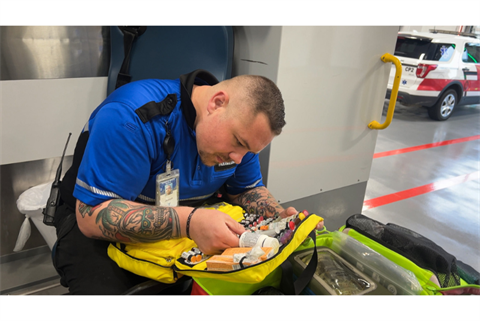Bridging the gap: Cabarrus EMS initiative delivers connection, hope
Published on June 06, 2024

Joey Steele remembers his first glimpse at a path forward.
Steele, now a Cabarrus County EMS senior paramedic, was working as a manager in a halfway house in 2015. He was there following a stay in rehab for a debilitating opioid addiction. One night, a good friend at the house relapsed and overdosed. Steele performed CPR, then watched as emergency crews tried valiantly to revive the man.
His friend passed away that night, but the efforts of the responding paramedics made a lasting impact on him.
Years of addiction, rehab and recovery programs led Steele to where he is today: helping save lives in Cabarrus County.
Steele also serves as a relief medic with the newly formed EMS Medication Assisted Treatment (MAT) Program. He joined that team as a “way to give back and be an asset.”
“Calls that pertain to drug use are a driving factor to keep me away from using,” Steele says. “It’s also very rewarding to be able to tell someone I’ve been there, and you can get out of it. You can build a life that’s really amazing.”
The MAT program officially started March 1, 2024, and is part of the Community Paramedic program. MAT uses FDA-approved medications along with education, connection to resources and primary care to help those battling addiction.
Clients are treated for up to five days while community paramedics try to find placement for treatment. That treatment can be in a primary care setting with a physician, an inpatient treatment center or with the Cabarrus Health Alliance, depending on patient needs.
“Clients have been very appreciative of the service,” says full-time MAT Community Paramedic Nicole Shapiro. “We meet them where they are and that is super helpful for someone who is struggling.”
Cabarrus County EMS has two full time MAT paramedics who are available from 8 a.m. to 8 p.m., seven days of week. EMS also has seven back up/relief MAT medics.
MAT paramedics operate out of one primary vehicle specially fitted for MAT calls.
In situations dealing with addiction, sometimes a listening ear can go a long way.
“It’s hard to build trust with someone who doesn’t know what you’re really going through,” Steele says. “I want everyone I meet to try as hard as they can to get off it because I know life is worth living. It can be done.”
The MAT program is paid for through opioid settlement funds which cover the vehicle, medical equipment and salaries.
The settlement funds are also being used for a similar joint MAT effort between the Cabarrus County Sheriff’s Office and Cabarrus Health Alliance. The organizations collaborate to treat Cabarrus County Detention Center inmates struggling with addiction during their stay and after their release.
Those funds cover healthcare provider and medicine expenses, nurse and medical technicians, drug testing and full-time positions.
Funding for both versions of the MAT program will last until June 30, 2027.
Over the next 18 years, Cabarrus County will receive about $21 million of the $1.5 billion Opioid Settlement Funds scheduled to go to North Carolina.
County officials developed a strategic plan for use of the funds that included a public survey and discussions with a variety of organizations, including the Mental Health Advisory Board, the Early Childhood Taskforce, the Juvenile Crime Prevention Council, local healthcare providers and other community partners.
Assistant County Manager Aalece Pugh presented the resulting plan to the Cabarrus County Board of Commissioners during their June Work Session.
Results from the community survey “supported the identification of root causes of addiction, drug misuse, overdose, and related community issues and lifted community voices,” according to the report. “The input also supported the review of existing programs, services, and supports, as well as gaps in the local continuum of care.”
The funding will go to both County-operated programs as well as non-County organizations, the report says.
Officials hope the MAT program will go a long way in helping those struggling with addiction.
“We’re trying to end the stigma,” Steele says. “We want the world to see the big picture, that this is a problem and not just bad people who got hooked on drugs. It’s affecting everyone.”
To watch Steele’s story on overcoming addiction, becoming a first responder and helping those who struggle with substance use, visit https://bit.ly/CabarrusEMSJoey.
If you or anyone you know needs help, call 704-920-2600 and choose Option 6 to speak to a community paramedic or email MAT_Paramedic@cabarruscounty.us.